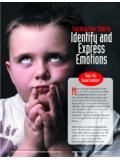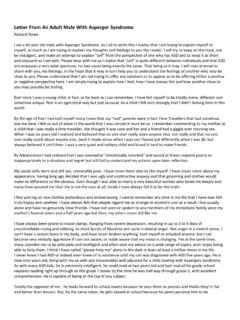Transcription of ADHD and MONTESSORI A CASE STUDY - Michael …
1 1 adhd and MONTESSORIA case STUDY_____Denise's Visit to California april - June, 1996 INTRODUCTION: Denise Mayclin, age eight, came from Florida to the Stephenson family in Arcata, California on April 30, 1996, and returned home on June 5. She came because it had been recommended, at three different schools, that she be put on Ritalin for suspected adhd . Her parents were determined to find out if there could be another way for her to learn. GENERAL APPROACH: Since Denise fit the description of an adhd person, to some extent traditional therapy might include drugs, and behavior modification by praise, reward, or punishment.
2 All of these are antithetical to the MONTESSORI the almost six weeks that Denise has been with us the program which has evolved to help her, based on observing her carefully has been threefold: (1) Observing the effect of TV, computer, sugar, and food additives on Denise, and changing the environment as a result of her reactions to these influences.(2) Providing a situation where she can concentrate on self-chosen activities which help her to ground , to focus, to process information at her own rate, and to heal (3) Identifying the courtesy lessons which teach her the skills to show respect for others, thereby improving her interactions with adults and children to help improve her very-low Here are some observations, a compilation of comments from the following sources, besides myself, who have spent time with Denise during this visit.
3 Jim Stephenson, uncle and MONTESSORI father of 13 years; Michael Stephenson, cousin; others, both friends and BEHAVIOR (or What exactly IS adhd ? ) Denise certainly exhibits many of the symptoms clustered these days under the name adhd (Attention-Deficit Hyperactivity disorder), such as having difficulty in situations controlled by others difficulty sitting still, waiting, not talking, listening, paying attention, not focusing on work. Symptoms also include nervously dropping things, and starting several projects and not completing them.
4 However all of her problems are exhibited only in the presence of others, so I would call them social problems. When she is alone Denise is able to choose work, concentrate and focus, complete cycles of activity working to the completion of one task before beginning another, and to take care of her needs completely independently and joyfully. I have observed her doing this for several days toward the end of her visit, 6-8 hours each day. Denise had, by this time, built up a repertoire of independent activities to choose at will and on which to concentrate.
5 We had guided her gently to the habit of putting away all of the materials from one activity before beginning on another. This seemed to help her mind to be more ordered, and her concentration abilities to activities include: washing dishes, cooking, watering the garden, thinking, reading, exploring nature, climbing in the tree house, caring for the cats, writing (in her journal and on cursive practice pages), knitting, exploring a variety of games, puzzles and blocks, several self-designed art projects, listening to music, playing percussion instruments and playing the piano.
6 There have been no televisions, computers, computer-type games available in the environment, and no books except good nonfiction and great literature, at several reading levels. There is no plastic (because the affects of handling plastic has not been tested enough for use by children), only objects made of natural materials wood, shell, rocks, etc. This has been like a health store environment for her , as I have been writing, Denise began working downstairs in the living room/bedroom/kitchen area at 9:00 am. She came up twice during that time to chat for a few moments.
7 At 2:30 she came up to tell me she had taken apart a California puzzle map (of counties) and could not get it put together. We looked for a geography book for pictures of the California counties, couldn t find one, put it together, went outside and ate a snack. At 3:00 I came back to work, Denise transplanted some small plants into her garden to see what they would grow into, then she watered all the potted plants on the deck and she is now playing the piano Suzuki pieces and quite creative and thoughtful compositions of her own.
8 At 4:00, I asked her if she would hang the towels out in the sun when she had a moment. She responded I would be happy to. She continued to work on her own until 5:30. This is a typical day Denise can live so happily when given this kind of independence, respect, and a calm, respectful, and supportive environment, she does not seem to me to need drugs! SOCIAL PROBLEMS Denise was exposed to long hours in front of television in necessary day care from her early weeks. It is not surprising that so many such children exhibit this cluster of adhd symptoms children who have been raised to bond with Barney instead of parents, to think of nature as something one sees on TV, and to learn to read, for example, on physically-damaging machines which train the brain to think in 5-second intervals or at emergency speed (TV s and computers), instead of in the arms of a loved one, with a beautiful book, creating picture in the mind at leisure and stopping for important conversations at any time.
9 How can a child raised by machines learn to function with humans? At the beginning of this visit we planned to get her together with other children her own age as often as possible. We could see, however, that although Denise is drawn to people of all kinds, the interactions usually deteriorate for various reasons which Denise does not understand. People think her unpredictable and strange even though kind at heart and well-meaning. More of such experiences did not seem to be what she exhibits many relationship problems when in the presence of other people.
10 She is constantly aware of others 2and how they are seeing her, trying to get some kind of attention from them. She seems to be worried about what impression is being made by her on others. It was not until after several weeks that I saw any natural behavior on her part even in my presence. She is constantly on stage , trying to get a person to like her, and if this doesn t work, to get them angry at her pushing the limits to see just how mad the person will get. She often will be well-behaved in the presence of the authority figure, but rude and annoying to a child in the next moment almost as a release of the strain of pretending to be perfect for the adult.





